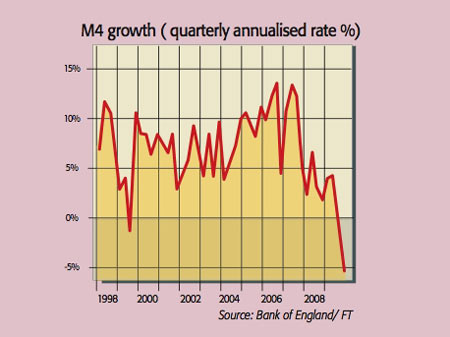
Britain is the only G20 country still officially shrinking after Canada announced growth in the third quarter.
And the latest data is discouraging. According to a CBI survey, sales at a majority of service-sector companies unexpectedly fell in the three months to November, while consumer confidence dipped for the first time in a year last month.
The Bank of England’s money supply and lending data figures for October cast further doubt on whether the Bank of England’s money-printing programme, or quantitative easing (QE), is having any impact.
What the commentators said
It seems that “QE is working not a jot”, said David Prosser in The Independent. The Bank looks at a measure of the money supply known as M4 to gauge the success of QE, and has said it wants to see it growing at pre-crunch levels. But in the three months to November, it shrank at an annualised rate of 5.3%. That’s a far cry from the increases of 6%-9% two years ago (see chart). “Nor is bank lending to business showing much improvement.” It fell by an annualised 3% in the same time span.
Part of the story, however, is about scant demand for credit as well as tight supply from banks. Take consumers, who as Howard Archer of Global Insight pointed out, are anxious to reduce their massive debt load. That’s why net consumer (unsecured) credit fell by almost £0.6bn in October, the biggest drop since records began in 1993 and double September’s figure. In addition, unemployment is not likely to peak until late next year, which will further undermine wage growth. So the outlook for consumption is weak, said Morgan Stanley. The economy will merely “limp out of recession”.
There could also be a nasty surprise in store next year. If there is a hung parliament next spring, it could dent confidence in the majority party’s ability to push through the fiscal tightening required to tackle the towering budget deficit. That could lead to a loss of our triple-A credit rating, which could trigger a sharp sell-off in the pound and rising gilt yields. In response the Bank may raise rates to shore up market confidence – thus choking off the fragile recovery.
In the run-up to next week’s pre-Budget report, however, the spotlight is on the “class war card” rather than sensible measures to plug the deficit, said Allister Heath in City AM. Measures based on taxing the rich “would barely make a dent”. But because the government senses an improvement in the polls that even suggest it could yet win next year, “a populist pre-Budget report it will be”.